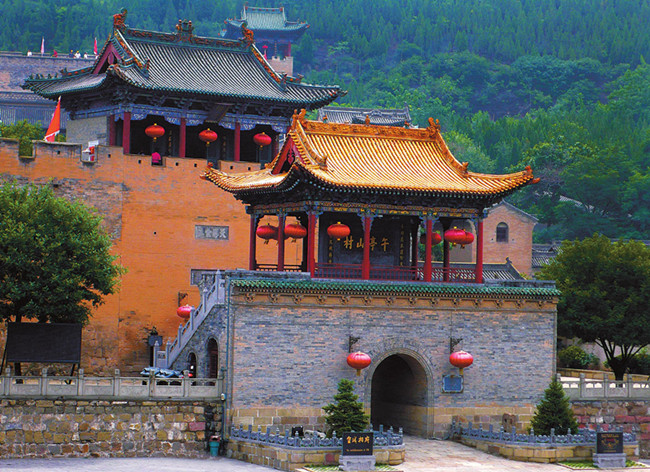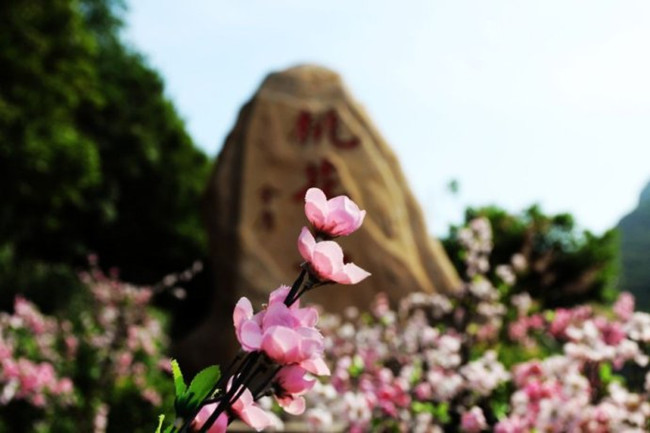
In ancient China, there was a saying: famous scenery benefits from famous writers' poetry. Now, fiction is the main form of literature and it also can make some unheralded scenic spots become popular. Let's take a glimpse at those scenic spots.
 |
|
Beautiful Changbai Mountain is popular once again thanks to the popularity of the best-selling novel, The Graver Robbers' Chronicles. [File photo] |
Changbai Mountain in Jilin province
Fans of The Graver Robbers' Chronicles, a best-selling suspense novel with a sales volume of 20 million through 2012, will never forget the famous date at end of the story. When Zhang Qiling, the main character, went into an ancient tomb under Changbai Mountain on August 17, 2005, he promised his friend that he would come back on the same day 10 years later.
Author Nan Pai San Shu also promised his readers that he would set an end to the whole story on the day Zhang Qiling come back. In that case, fans of the book surged to the mountain recently to "witness the miracle".
Even the author failed to stop the frenzied reactions of his fans. They've rushed to the area around the mountain since Sunday and pulled out all the stops to get accommodation. They climbed the mountain at midnight to "wait for" the main character's "return".
According to a report by Jilin media, the number of visitors increased 50 percent this summer, compared with the same period in last year. Most of them, mainly post-90s, are fans of the book.
 |
|
The residence of Chen Tingjing, the leading role in Chinese writer Wang Yuewen's anti-corruption themed novel, is a popular destination for many Chinese people. [File photo] |
Premier's Palace in Shanxi province
Since the end of 2013, fiction themed on anti-corruption in the Qing Dynasty (1636-1912), Da Qing Xiang Guo (Premier of Qing Dynasty),became very popular in China. It was endorsed by Wang Qishan, a member of the Standing Committee of the Political Bureau of the Communist Party of China (CPC) Central Committee and secretary of the CPC Central Commission for Discipline Inspection.
Author Wang Yuewen, a well-known "officialdom" writer of novels, said the story of the leading role Chen Tingjing, premier during the reign of Emperor Kang Xi, has significant parallels to modern Chinese people, especially Chinese officials.
As China's nationwide anti-corruption campaign continues, Chen Tingjing's former residence, which has a history of more than 400 years, attracted more and more Chinese visitors. Special trains seemed to endlessly transport visitors from Beijing, Tianjin and many provinces like Henan, Shaanxi, Shandong and Jiangsu to the Premier's Palace.
More than 40,000 visitors flocked to the scenic spot during the Qingming Festival in 2014, a record, according to the palace administrator. During the Labor Day holiday that year, 278, 200 visitors went sightseeing at the palace, an increase of 21.7 percent compared with the same period in 2013.
 |
|
Taohua Island (Peach Blossom Island) uses its role in Jin Yong's Kung Fu novels to enhance its popularity. [File photo] |
Taohua Island (Peach Blossom Island) in Zhejiang province
Taohua Island (Peach Blossom Island) is one of the islands of the Zhoushan Archipelago, under the administration of Putuo District in Zhejiang province. It is mentioned many times in the famous Kung Fu novels Condor Trilogy and The Return of the Condor Heroes by Jin Yong, one of the most influential modern Chinese novelists as well as a co-founder of the Hong Kong newspaper, Ming Pao Weekly.
To attract more visitors, the administrators of the island tried their best to present the architecture and scenery related to Jin’s works. They built the residence of the leading roles in the stories, named restaurants and hotels for major characters, and even planned to spend 2 million yuan ($312, 600) to create a statue of Jin Yong.
According to Mr. Yao, an official in charge of publicity on the island, they used Jin Yong as a brand to develop tourism there.
"We just want to enlarge the popularity of our scenic spot. In that case, we'd like to do anything as long as it is good for the development of tourism. Mr. Jin once said something similar as well," he added.
 |
|
After Mo Yan won the Nobel Prize for Literature, his former residence turned into a hot scenic spot overnight, and even brought trouble to Mo’s family members. [File photo] |
Mo Yan's former residence in Shandong province
Since 2009, the former residence of famous Chinese writer Mo Yan has been developed into a scenic spot by the government of Gaomi city in Shandong province. But for a long time, there were few visitors.
In 2012, Mo became the first Chinese winner of the Nobel Prize for Literature. His former residence became a scenic hot spot overnight. Hundreds of visitors have come to the residence since October 2012 when it was announced Mo won the world's top prize for literature, according to Mao Weijie, head of the Museum of Mo Yan's Literature Works.
"Some of them are literary amateurs, some are officials, some are students. In addition, so many journalists at home and abroad swarmed into the residence for interviews. We were totally overwhelmed," he said.
Guan Moxin, Mo's elder brother, once complained that too many visitors in the residence damaged it and troubled them.
"Some parents pulled up radishes in the garden for their kids. They told me that if their kids ate the radish, they might get the Nobel Prize in the future like my brother. Finally, all the vegetables in the garden were taken away. Some people were even crazier. They took soil in plastic bags for their kids, and said if they drank the water with the soil, knowledge and literary talent would be in their stomachs. Some visitors just wanted to get something as a souvenir from our former residence, so they took away anything they could get, like stones in the wall or tiles on the roof," he said angrily.
According to reports by Chinese media in 2014, the Gaomi government planned to spend 1.67 billion yuan ($261 million) to set up a rural cultural experience area near Mo's former residence. The scenes in Mo's masterpieces will be turned into reality in the future. Meanwhile, a site for a new Museum of Mo Yan’s Literature Works is being selected and money raised as well.

Presented by Chinadaily.com.cn Registration Number: 10023870-7
Copyright © Ministry of Culture, P.R.China. All rights reserved